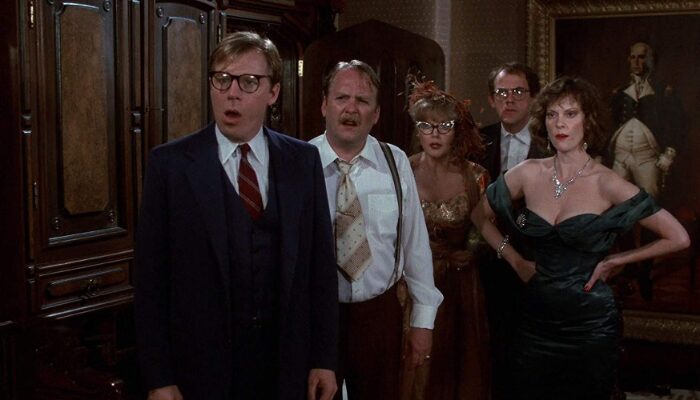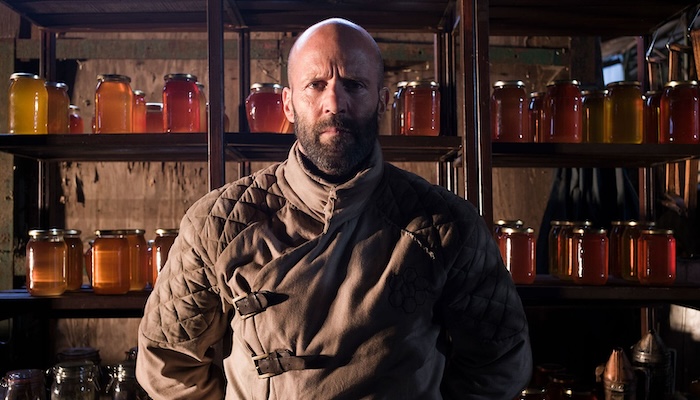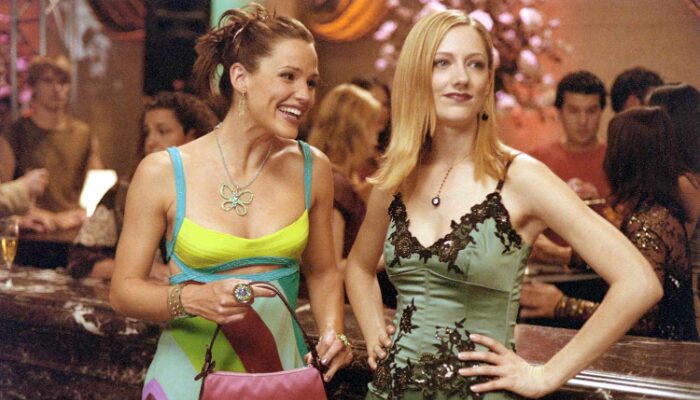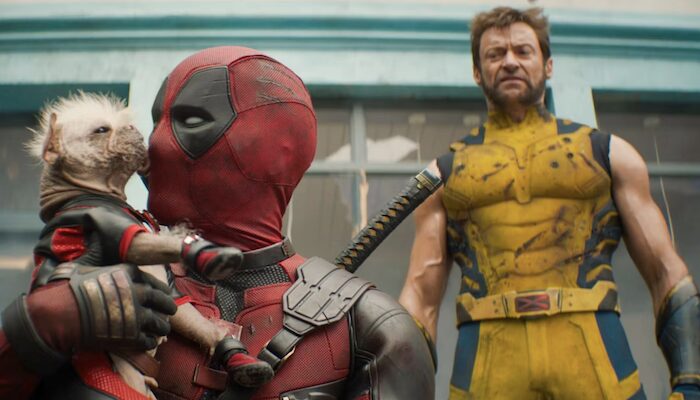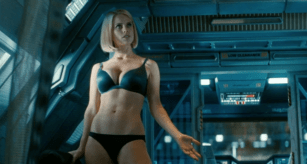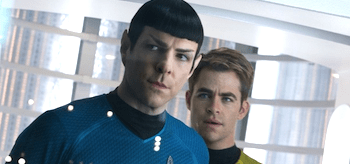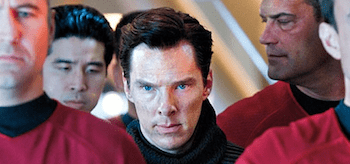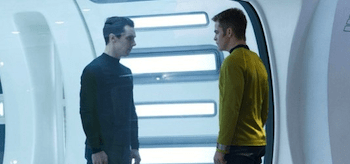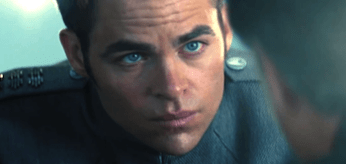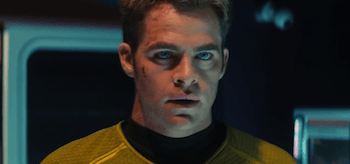Film Review: Star Trek (2009)

Star Trek, for all intents and purposes, is about a ship from the future, a Romulan mining ship, traveling into the past (which is why there is no reality shift like in the superiorly written Star Trek: The Next Generations episode: “Yesterday’s Enterprise”.) Now in the era of the Enterprise-B (I believe it’s the B), the Romulan ship’s bellicose actions alter its destiny and subsequently, the future.
In the second act of Star Trek, the inexplicable begins rearing its deformed head. If you want someone off of the vessel you are the defacto Captain of and you want to deposit them at an outpost, why not beam them directly into the outpost? Why not deliver them to the outpost via shuttle craft? Why drop newly minted First Officer Kirk (Chris Pine) in an escape pod miles away from a Federation outpost in a hostile environment inhabited by predators unarmed? The “logic” of this choice by screenwriters Roberto Orci and Alex Kurtzman escapes me. Perhaps they wanted some monster effects in the film and constructed this sequence around that desire hoping people would not realize that The Enterprise has a brig that would have served the same disciplinary purpose of keeping the impulsive First Officer out of everyone’s hair.
Every story needs an antagonist of some kind or there is no drama. In Star Trek’s case it is a Romulan Captain named Nero (Eric Bana). Nero is bent on the hackneyed occupation of revenge seen in countless films (including past Star Trek films) and throughout literature, most notably The Count of Monte Cristo and Moby Dick (referenced in both Star Trek: The Wrath of Khan and Star Trek: First Contact). Nero looks and acts the part but he has no characterization once-so-ever and is bland. His character, like so many others before him, is an after-thought. He is the reason for the events in the film, nothing more. He and Captain Christopher Pike (Bruce Greenwood) should have been the third and fourth most developed characters in the film yet they are the least. They are not the stars of the film or whom the audience is supposed to be focusing on and unfortunately, they are treated as such. I was really looking forward to Pike and his “delta radiation moment” from the original series (The Menagerie) but with the time line changed, that fate for Pike was altered. These were missed opportunities, especially in the former’s case. Making Nero like Khan Noonien Singh from Star Trek: The Wrath of Khan would have admittedly been a mistake. There is only one Khan. Since Nero is a miner, that is his professed profession, why not have him speak in present day miner lingo and slang, especially when talking to his crew and when addressing each other?
The fact that Nero sat in his mining ship for twenty-five years and never contacted the Romulan Empire in that era is absurd. Why not arm The Empire with your advanced weapons, duplicate the weapons for them, garner their assistance, and lead an armada to destroy earth? In Star Trek: First Contact, The Borg were intelligent enough to try and communicate with The Borg in that era when they went back in time. Why not Nero or some member of his crew? Haven’t they ever heard the phrase: “Two are better than one”? Nero obviously believed that his mining ship, with its advanced technology and crew of blue-collar miners, could get the job done by itself against a fleet on interstellar starships crewed by military officers and soldiers. This was a very brave, frustrating and foolhardy move on Nero and his crews’ part.
Star Trek is filled with many good moments. Dr. Leonard “Bones” McCoy (Karl Urban)’s entrance and resultant dialog regarding his “trust issues” and troubles instantly bring back memories of DeForest Kelly’s memorable doctor and personality quirks while Pavel Chekov (Anton Yelchin) is so well written and acted by Yelchin that he deserved more screen time. These good moments are not as great as those in Star Trek: First Contact (e.g. Lily confronting Captain Jean-Luc Picard) and Star Trek: Generations (e.g. Data and his hilarious Life Forms song) deposited throughout their runtime. I understand why some will balk at this statement so allow me to clarify. Star Trek: First Contact and Star Trek: Generations do not spend time explaining why characters act the way they do. That has already been explored Ad nauseam in the series they pertain to. This allowed the films more screen time for new characters to be developed and for exposition. This does not happen with Nero so we are left to imagine what his character would have been like if he had been given a past like Lursa and B’Etor in Star Trek: Generations or Khan in Star Trek: The Wrath of Khan. How much more effective would his words and actions have been if this had transpired? In Blade Runner, the viewer sees four examples of what can happen when a person has no past to cushion and guide their emotional responses and actions. Even this extreme is not present in Nero. When Praetor Shinzon slammed down his fist and said: “Silence Romulan!” in Star Trek: Nemesis, the viewer felt his nurtured anger born of hatred, bitterness and long years of slavery (18 hour work days under the lash for ten years in a mine). With Nero there is nothing, even when he is angry or indignant, and it has nothing to do with Bana’s adequate performance. It has everything to do with how his character was written. Look at The Joker in The Dark Knight, his actions and personality completely overshadowed and made unnecessary the need for a past. The same care was not given to Nero. As was stated earlier, his character was an after-thought for he is only an antagonistic mechanism.
Speaking of characters, Leonard Nimoy’s Spock is pretty much wasted in this film. In Star Trek, he is the connective tissue between the old Star Trek fans and the new ones Paramount Pictures’ executives hope to cultivate. It may have been better for Star Trek if Spock had not been in it at all or had been used in a different way, perhaps along the excellent lines of the Star Trek: The Next Generation episode: “The Inner Light”. The fact that older Spock risks the destruction of Earth on the chance that Kirk can get the twenty (something) year old Spock (Zachary Quinto) to react emotionally is dubious and irrational (too much is at stake), especially since older Spock does not know that younger Spock’s mother has just died. The fact that this was done in the name of a possible friendship, and getting Kirk into the Captain’s chair, is a plot point very hard to comprehend. Two people do not need to like each other in order to respect and work well with one another. This point was exemplified in one of Star Trek: The Next Generations’ finest episodes: “The Best of Both Worlds”.
In the third act of Star Trek, Nero has the choice of whether or not to accept Federation aid for his critically damaged ship and his crew. The question that screamed to be answered during this scene was: Why does it matter what he wants, if he wants to be rescued or not? He is a criminal, as is his crew. They all should have been beamed to The Enterprise’s brig without notification or permission and placed under arrest. Summary execution when you have beaten your enemy and disabled their ship is something Captain Jonathan Archer (mentioned as Admiral in this film) let alone Captain Picard would never do, no matter how much they may have personally wanted to. Kicking a crippled dog when it is down is something a Star Fleet Officer would find reprehensible, especially in front of his or her crew. Star Fleet is supposed to be the ambulant example of cooperation, peace and unity in the galaxy. Abrams should have kept this in mind. This segment of Star Trek is an enormous error on the part of Orci and Kurtzman. An off-screen war crimes trail would have been more appropriate, relevant, and dare I say “logical”. In addition, by saving Nero’s crew and their ship, you also save their advanced technology and computer databases. The timeline has already been changed so what does it matter if you take and utilize advanced technology from the future.
J.J. Abrams’ Star Trek is a big budget sci-fi film with great intentions, great execution, an average script with sections of good writing and a unoriginal, pedestrian conclusion that has become the hallmark of safe, family-friendly, franchise building (so they hope) Hollywood films. For all of the pluses imbuing Abrams’ Star Trek expedition, they are challenged by many minuses. Star Trek is a moderately entertaining sci-fi film far too “user friendly” for true sci-fi fans, unnecessarily goofy in places (e.g. Simon Pegg’s Montgomery “Scotty” Scott in the water tube) and a franchise reboot that could have been far sturdier if a more realistic approach had been taken with its deleterious aspects.
Rating: 7/10
Soundtrack Review for Star Trek (2009)
If you enjoyed this article, subscribe to us by Email or Full RSS Feed to be informed when we post new ones.
Related Articles
FilmBook's Newsletter
Subscribe to FilmBook’s Daily Newsletter for the latest news!

